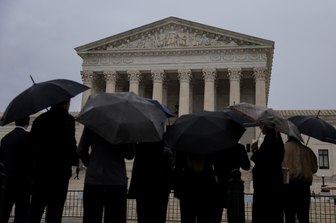A new YouGov poll asked Americans about patriotism and their country's future. Compared with April 2024, Democrats are less likely now to say they’re proud to be American, and far more likely to think the country’s best days are in its past.
73% of Americans — including 96% of Republicans — say they are proud to be an American. 14% of U.S. adult citizens say they are not proud to be an American and 13% are not sure.
24% of Democrats, 19% of Independents, and less than 1% of Republicans say they are not proud to be an American.
The share of Democrats who say they are proud to be an American has decreased in the last year, to 58% from 66% in April 2024.
One-third (34%) of Americans think their country's best days are in its past — down from 46% in April 2024. Just as many (34%) think the country’s best days are in its future, including 22% of Democrats and 50% of Republicans. Only 9% of Americans — including 3% of Democrats and 17% of Republicans — think their country's best days are happening right now.
44% of Americans think that the prospects for the country’s future are better than for most other countries. 19% think they’re about the same as for most other countries, and 23% think they’re worse than for most other countries.
Republicans (73%) are much more likely than Democrats (19%) to think the prospects for the country’s future are better than for most other countries.
About as many Americans say Donald Trump is very patriotic as say they are themselves (44% vs. 42%). Less say the Republican Party (30%), Joe Biden (28%), the Democratic Party (21%), or Americans in general (21%) are very patriotic.
Republicans are more likely than Democrats to describe the following as very patriotic:
Trump (80% vs. 10%), the Republican Party (54% vs. 12%), themselves (64% vs. 31%), and Americans in general (27% vs. 18%).
Compared with April 2024, Republicans are now more likely to describe Americans in general as very patriotic (13% then to 27% now); the same is true for the Republican Party (44% to 54%) and for Trump (72% to 80%).
Half (50%) of Americans think the Republican Party considers itself to be more patriotic than the Democratic Party; 18% think the Democratic Party considers itself to be more patriotic than the Republican Party. 81% of Republicans and 26% of Democrats think the Republican Party considers itself to be more patriotic. Compared to April 2024, Democrats are now more likely to say the Democratic Party considers itself to be more patriotic (36% then to 47% now).
One-third (31%) of Americans say they’re more patriotic now than they were as children, up from 26% in April 2024. 25% say they are less patriotic now, and 31% say they’re equally patriotic.
Republicans are especially likely to say they’re more patriotic now than they were as children (50%). Fewer Republicans (41%) said the same last year.
One-half (48%) of Americans think Americans in general are becoming less patriotic. Fewer (22%) say they’re becoming more patriotic or that there is no change (14%). Republicans are as likely to say Americans are becoming less patriotic (38%) as they are to say Americans are becoming more patriotic (38%).
The majority (62%) of Americans say “acknowledging problems in your country and seeking solutions” comes closer than “supporting your country unconditionally” to their definition of patriotism. Majorities of Democrats (69%) and Republicans (57%) agree.
28% say “supporting your country unconditionally” comes closer to their definition of patriotism. 23% of Democrats and 36% of Republicans say this is closer to their definition.
What actions can someone take and still be considered patriotic? Majorities of Americans agree that it’s possible for an American to still be considered patriotic if they participate in peaceful protests (84%), criticize Joe Biden (73%), criticize Donald Trump (72%), or criticize past actions taken by the U.S. Less say an American can criticize our leaders to foreigners (45%), refuse to serve in a war they oppose (45%), or choose not to vote (43%) and still be considered patriotic.
The actions included in the poll that the smallest shares of Americans say a person can do and still be considered patriotic: participate in violent protests (11%), burn an American flag in protest (20%), and refuse to pay taxes (20%).
Among the biggest gaps between Democrats and Republicans: 60% of Democrats and 33% of Republicans say a person can criticize our leaders to foreigners and still be considered patriotic. 46% of Democrats and 22% of Republicans say a person can choose to move to another country and still be considered patriotic. 29% of Democrats and 5% of Republicans say an American can burn the American flag in protest and still be considered patriotic.
Americans are less likely now than they were in June 2022 to say a person can criticise our leaders to foreigners and still be considered patriotic (45%, down from 53%).
Compared to June 2022, Democrats are less likely now to say a person can burn an American flag in protest and still be considered patriotic (29%, down from 39%). They’re also less likely to say a person can be patriotic despite refusing to serve in a war they oppose (50%, down from 60%.
In times of danger to the country, only 11% of U.S. adult citizens think we can count on all Americans. Three-quarters (74%) think the country can’t trust some of them. Republicans (81%) are more likely than Democrats (71%) to say some Americans can’t be trusted in times of danger.
Distrust among Republicans has shifted between 2022 and 2025. In 2022, 76% said not all Americans can be trusted. In 2023, 82% held this belief; in 2024, 88% did. Now 81% do.
When the question was first asked in a National Opinion Research Center poll in 1953, 32% of Americans thought we could count on all Americans in times of danger, about three times the share who say this now. 62% believed there were some that could not be trusted.
About half (53%) of Americans say the statement “You’re sick and tired of hearing people attack patriotism, morality, and other traditional American values” describes how they feel, down from 72% in a 1972 Time/Yankelovich survey. 31% say it does not.
Republicans are far more likely than Democrats to say the statement describes how they feel (81% vs. 31%).
Do Americans regard voting as a duty or as a right? 31% believe it’s a right, 21% think it’s a duty, and 38% say it’s both. Identical shares of Democrats (41%) and Republicans (41%) say voting is both a duty and a right.
Americans are more likely to see voting as a right now (31%) than they were in June 2022 (23%), though 31% saw it as a right in 2023.
When the question was asked in 1944 by NORC, far more Americans (59%) saw voting as a duty. 36% saw it as a right and only 2% said it was both.
Related:
- Which groups do Americans think Donald Trump cares about most?
- Ahead of July Fourth, here’s what Americans think about fireworks, democracy, and the American Dream
- Polls from the Past: Democracy, Patriotism, and Trust in Other Americans
See the results for this YouGov survey
— Carl Bialik and Taylor Orth contributed to this article
Methodology: This article includes results from an online survey conducted March 14 - 17, 2025 among 1,132 U.S. adult citizens. Respondents were selected from YouGov’s opt-in panel to be representative of adult U.S. citizens. The sample was weighted according to gender, age, race, education, 2024 presidential vote, 2020 election turnout and presidential vote, baseline party identification, and current voter registration status. 2024 presidential vote, at time of weighting, was estimated to be 48% Harris and 50% Trump. Demographic weighting targets come from the 2019 American Community Survey. Baseline party identification is the respondent’s most recent answer given around November 8, 2024, and is weighted to the estimated distribution at that time (31% Democratic, 32% Republican). The margin of error for the overall sample is approximately 4%.
Image: Getty (Spencer Platt / Staff)
What do you really think about President Trump, American politics in general, and everything else? Share your reality, join the YouGov panel, and get paid to share your thoughts. Sign up here.







